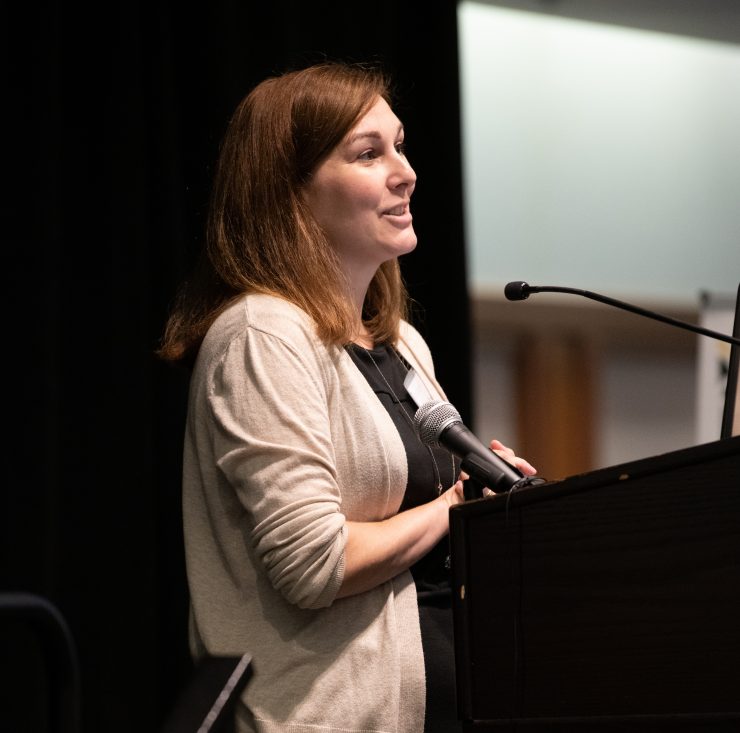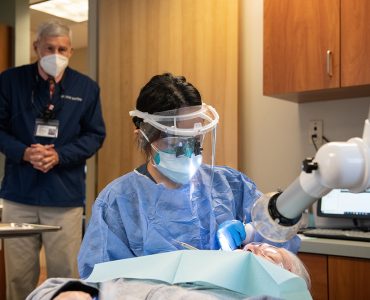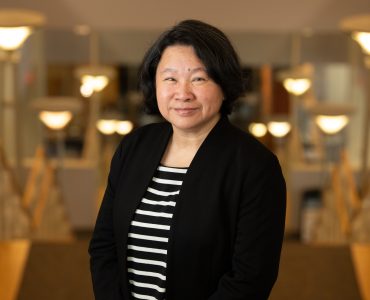After sending off the first cohort of graduates last spring in the University of Maryland School of Pharmacy’s (UMSOP) Master of Science in Medical Cannabis Science and Therapeutics Program, the nation’s first such graduate program continues strong with its new Class of 2023.
“Now, we give you the science background,” said Andrew Coop, PhD, professor and associate dean of academic affairs, UMSOP, speaking to the new incoming students. “You’re going to get the clinical background. You’re going to get the negative outcomes background. You’re going to get the law background. You’re going to get the analytical background, and you’re going to get all this. It’s going to be a long journey. What are you going to do with it?”
Students in UMSOP’s MS in Medical Cannabis Science and Therapeutics, the only one of its kind in the nation, were eager to answer that question as they gathered in September for the program’s Fall Symposium, launching their education in the burgeoning industry. More than 200 students attended the event at the Universities at Shady Grove (USG) in Rockville, Md.
Carlos Hernandez, MD, traveled from Costa Rica to attend the symposium. “It was a very long journey,” he said.
A general practitioner, Hernandez, known as the “Cannabis Doctor” in his country, has been prescribing cannabinoids to patients for four years.
With his MS degree, “I hope to bring all this information to advocacy and policy creation in my country, because we are on the verge to actually produce and regulate cannabis in my country,” he said.
Supporting Patients and the Medical Cannabis Industry
Launched in August 2019, the program provides students with the knowledge and skills needed to support patients and the medical cannabis industry, add to existing research in the field, and develop well-informed medical cannabis policy. Based at USG, the two-year program is designed for any individual who has completed an undergraduate degree and is interested in pursuing a career in the medical cannabis industry.
The program director is Leah Sera, PharmD, MA, BCPS, assistant professor in the Department of Pharmacy Practice and Science, UMSOP, and a clinical pharmacist who practices in the field of palliative care. “We have students with backgrounds in science and medicine; students who have studied law, public health, business, political science, communication; and students with backgrounds in many other fields,” Sera said. “I believe that this diversity will make this experience all the richer for you, and for those of us teaching in and supporting the program.”
The MS in Medical Cannabis Science and Therapeutics is the first graduate program in the country dedicated to the study of medical cannabis. It aims to meet the needs of all individuals interested in advancing their knowledge about medical cannabis, including health care professionals such as physicians, nurses, and pharmacists; scientists and regulators; growers and dispensary owners; and policy and industry professionals.
Online coursework is designed to accommodate students with or without a background in science or medicine. In-person symposia are typically held once each semester to provide students with opportunities to network with peers, as well as meet and interact with experts in the science, therapeutics, and policy of medical cannabis.
Trailblazers, Innovators, and Changemakers
The first group of students entering the two-year program — 135 of them — graduated in May 2021. The unique program blends online learning with face-to-face experiences. During the coronavirus pandemic, students and faculty were required to adapt to a fully online learning model.
“I’ve been able to create amazing connections with amazing people as a result of this program. This experience has been game-changing personally and professionally.”
Tecoya Farrakhan, PharmD ’02, MBA, MS ’21
Karriem Farrakhan, PharmD ’03, MBA, MSc, MS ’21, and his wife, Tecoya Farrakhan, PharmD ’02, MBA, MS ’21, graduated together despite the pandemic challenges of helping two teenage daughters with remote learning and running a health and wellness company and a pharmacy services business.
“When I heard that the University of Maryland School of Pharmacy was offering a graduate program focused on the science and therapeutics of cannabis as medicine, I was overwhelmed with excitement and anticipation,” Karriem Farrakhan said. “My alma mater was offering the nation’s first master’s program in cannabis science and therapeutics, and I knew that I had to be a part of it.”
“I’ve been able to create amazing connections with amazing people as a result of this program, and it will be something I will never take for granted,” Tecoya Farrakhan said. “This experience has been game-changing personally and professionally.”
Natalie D. Eddington, PhD, FCP, FAAPS, dean and professor, UMSOP, called the first graduates of the program “trailblazers and leaders, innovators and risk takers, and changemakers.”
“As states have legalized medical cannabis, trailblazers like you have lined up to be at the forefront of this emerging industry by opening or working in dispensaries or welcoming patients into your medical practice,” she said. “Those of you not directly involved in the industry seek ways to be involved, to advocate for improved regulations and policies, to change laws, and to better understand the science of this plant.”
Addressing Basic Science, Clinical Use, Public Health, and Relevant Laws
The School of Pharmacy’s MS in Medical Cannabis Science and Therapeutics addresses the areas of basic science, clinical use, adverse effects and public health, and federal and state laws and policies surrounding medical cannabis. Online coursework is designed to accommodate students with or without a background in science or medicine as well as offer flexibility when completing assignments.
“The field of medical cannabis has grown and evolved in the two years since you started this program, and I see now clearer than ever the need for individuals with your expertise to nurture and push this industry forward. With your passion, knowledge, and skill, you will improve the lives of patients through research, practice, education, and advocacy,” Sera told the first graduates of the program.
For Kevin Merillat, MBA, MS ’21, entering the program was a way to achieve his goal to validate cannabis use.
“Now that I’ve graduated, I have the tools needed to make change through education based on scientific foundations,” he said. “I am honored to be one the first people to receive an MS degree in cannabis science so I can help influence lawmakers to make decisions based on science, not prejudice.”
To better meet the needs of working professionals, the MS in Medical Cannabis Science and Therapeutics does not require the completion of a thesis. Instead, students complete a capstone course that features a selection of expert seminars, case studies, and discussions. Graduates of the program have acquired the skills to be able to help identify patients appropriate for medical cannabis therapy and determine appropriate dosing and administration for those patients; ensure the safe and effective design, development, and manufacture of medical cannabis products; identify potential research opportunities related to the science and health effects of the cannabinoids found in medical cannabis; and participate in health policy decision-making processes related to medical cannabis.
The MS in Medical Cannabis Science and Therapeutics welcomes students who possess a bachelor’s degree from an accredited college or university, currently work or are interested in working in the medical cannabis industry, and have the ability to travel once per semester to attend required symposia at USG, which is located in a suburb of the nation’s capital.
Megan Arnold, an elementary music teacher from New Hampshire, attended the symposium this fall and was inspired by her husband, a nurse, who has seen the benefit of medical cannabis in his work with veterans with post-traumatic stress disorder.
“His experience with veterans and PTSD, and his own personal experience with PTSD and treatment with cannabis inspired me to do some more research and figure out what was going on,” Arnold said. “And the more I researched, the more intrigued I was with what I was learning as compared to what I had been taught.”
After teaching music for 22 years, she took a leave of absence to plunge into the MS in medical cannabis program.
“The advocacy drove me to this program,” she said. “To me, it seems like a way that I can learn and then continue to teach, even if it’s not music.”
To learn more, visit the program’s website.




